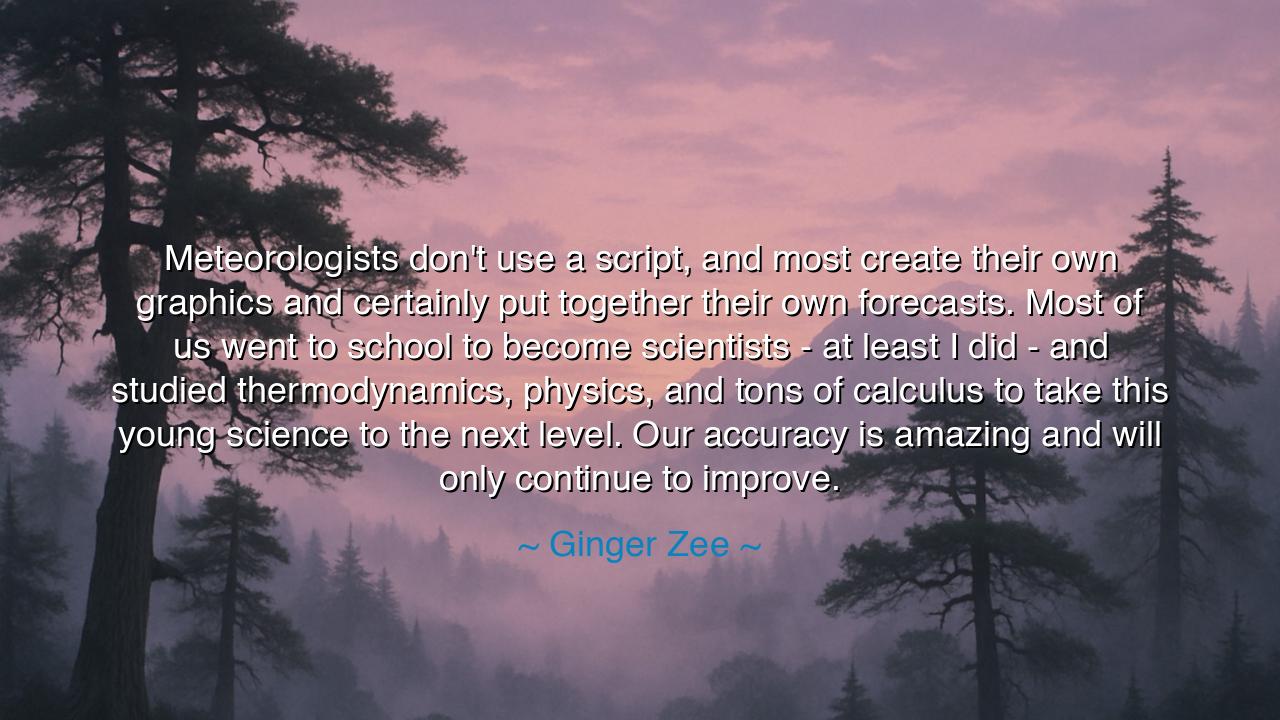
Meteorologists don't use a script, and most create their own
Meteorologists don't use a script, and most create their own graphics and certainly put together their own forecasts. Most of us went to school to become scientists - at least I did - and studied thermodynamics, physics, and tons of calculus to take this young science to the next level. Our accuracy is amazing and will only continue to improve.






Hear, O Seekers of Knowledge, the words of Ginger Zee, a voice from the world of weather and science, who speaks not of the art of prediction, but of the rigorous study and science that lies behind it. "Meteorologists don't use a script, and most create their own graphics and certainly put together their own forecasts. Most of us went to school to become scientists - at least I did - and studied thermodynamics, physics, and tons of calculus to take this young science to the next level. Our accuracy is amazing and will only continue to improve." In these words, Zee reminds us that the science of weather is not a simple matter of reading from a script or guessing at the unknown. Rather, it is a discipline grounded in the rigor of scientific study, one that takes the vast, complex forces of nature and seeks to understand them through the lens of physics and mathematics.
Consider, O Seekers, the ancient philosophers and their study of the natural world. Aristotle, in his time, sought to understand the movements of the heavens and the earth. He theorized about the forces that govern the weather, though he did not possess the tools or knowledge to see the world as we now do. His curiosity about nature and his quest to understand the forces at play was rooted in observation and reasoning. Yet, the weather was often as mysterious as the stars themselves, and it would take centuries for science to unlock its secrets. In the same way, Zee’s words remind us that the journey of understanding the weather, from ancient speculation to modern prediction, is one of evolution and progress.
In the modern era, the study of the weather has become a science—a field of study grounded in thermodynamics, physics, and the precise calculation of variables that govern the atmosphere. Just as Galileo used the telescope to peer into the heavens, so too do meteorologists use the tools of modern science to predict the forces at work in the sky. Zee, like so many before her, has spent years honing her understanding of these forces, studying the laws of thermodynamics, the currents of the atmosphere, and the calculations that allow for accurate forecasting. Her work, and the work of those like her, builds upon centuries of scientific discovery, taking the mysteries of weather to new levels of accuracy and precision.
Just as Newton’s laws of motion transformed our understanding of the universe, the work of meteorologists has revolutionized our understanding of the atmosphere and the forces that shape our weather. The development of forecasting tools, powered by calculus and the laws of physics, has allowed meteorologists to predict storms, hurricanes, and tornadoes with ever-increasing accuracy. When Zee speaks of the future, she speaks not only of weather forecasts but of the continued progress of science. With each advancement in technology, with each new mathematical model developed, the accuracy of weather predictions continues to grow, offering us a glimpse into the power of science to shape our understanding of the natural world.
In the ancient world, science was often a blend of philosophy and speculation, with few tools to measure or calculate the forces at play. Yet, as humanity’s understanding of the world expanded, so too did its ability to understand the forces of nature. The scientific method—the pursuit of hypotheses, experiments, and analysis—allowed us to move from ancient myths to modern discoveries. The story of weather forecasting, from the observations of early philosophers to the advanced calculations of today, is a tale of the progress of human knowledge. It is the story of how we went from seeing the weather as an unknowable force to understanding it as a complex system that can be predicted, studied, and harnessed.
The lesson, O Seekers, is clear: science is not a passive pursuit, but a journey of discovery, one that requires hard work, study, and dedication. Just as Ginger Zee spent years learning the complexities of weather, so too must we invest in the study of the world around us. Weather is not merely a matter of chance or intuition; it is the result of complex laws and forces that can be understood through the lens of science. The accuracy of meteorology today, and its continued advancement, is a testament to the power of knowledge and the dedication of those who seek to understand the world in all its complexity.
So go forth, O Seekers, with the understanding that science is not a matter of guesswork, but of knowledge, study, and calculation. Just as meteorologists like Ginger Zee have brought us to the forefront of weather prediction, so too must we continue to dedicate ourselves to the pursuit of knowledge, to understanding the forces that shape our world. Whether in weather, medicine, or technology, let us follow the example of those who have gone before us—those who dared to seek the truth behind the mysteries of nature and, in doing so, transformed the world for the better. Let the pursuit of knowledge be a path of dedication, and may the tools of science continue to reveal the wonders that lie just beyond our reach.






AAdministratorAdministrator
Welcome, honored guests. Please leave a comment, we will respond soon